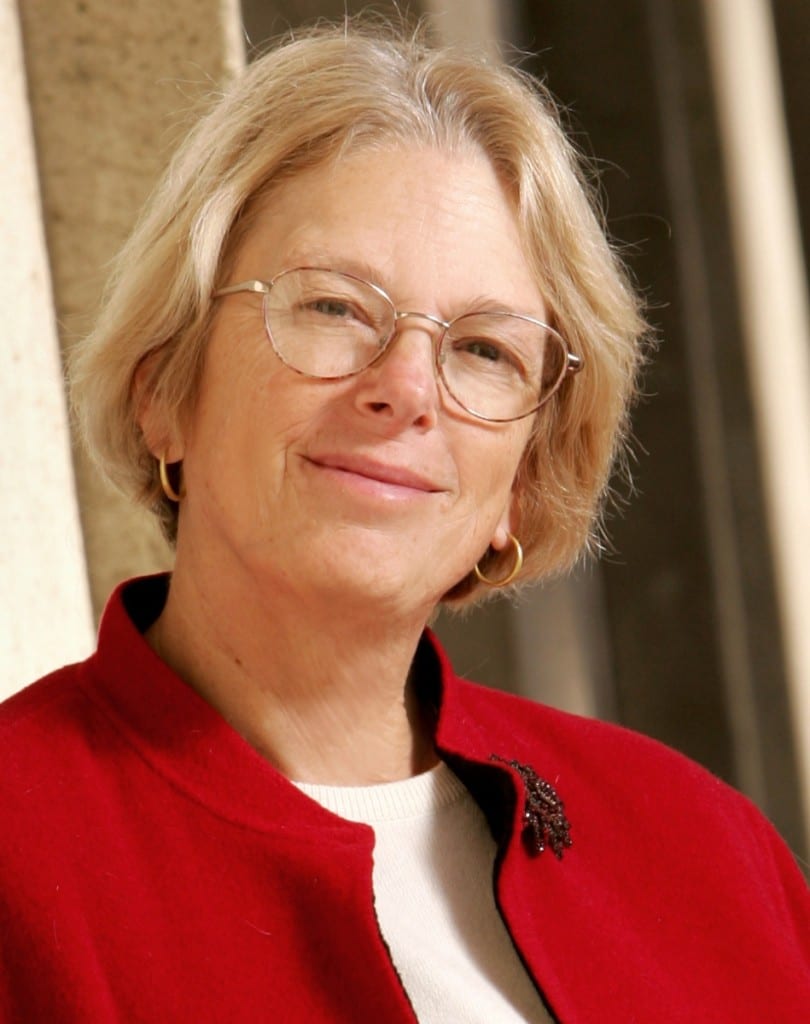Pamela Samuelson is the Richard M. Sherman Distinguished Professor of Law and Information at the University of California, Berkeley. She is recognized as a pioneer in digital copyright law, intellectual property, cyberlaw and information policy. Since 1996, she has held a joint appointment at Berkeley Law School and UC Berkeley’s School of Information. Samuelson is a director of the internationally-renowned Berkeley Center for Law & Technology. She is co-founder and chair of the board of Authors Alliance, a nonprofit organization that promotes the public interest in access to knowledge. She also serves on the board of directors of the Electronic Frontier Foundation, as well as on the advisory boards for the Electronic Privacy Information Center, the Center for Democracy & Technology, and Public Knowledge.
Samuelson began her legal career as an associate with Willkie Farr & Gallagher in New York. She began her career as a legal academic at the University of Pittsburgh School of Law, from which she visited at Columbia, Cornell, and Emory Law Schools. While on the Berkeley faculty, she has been a distinguished visiting professor at University of Toronto Law School as well as a visiting professor at the University of Melbourne and Harvard Law Schools. She was named an honorary professor at the University of Amsterdam in 2002.
Samuelson has written and published extensively in the areas of copyright, software protection and cyberlaw. Her recent publications include: Generative AI Meets Copyright, 381 Science 158 (2023); Discovering the Impact of eBay on Copyright Injunctions Through Empirical Evidence, 64 Wm. & Mary L. Rev. 1447 (2023) (with Matthew Sag); Withholding Injunctions in Copyright Cases: The Impact of eBay, 63 Wm. & Mary L. Rev. (2022); Interfaces and Interoperability After Google v. Oracle, 100 Texas L. Rev. 1 (2021) (with Mark A. Lemley); The Disgorgement Remedy of Design Patent Law, 108 Calif. L. Rev. 183 (2020) (with Mark P. Gergen); Staking the Boundaries of Software Copyrights in the Shadow of Patents, 71 Fla. L. Rev. (2019); Saving Software’s Fair Use Future, 31 Harv. J. L. & Tech. 535 (2018) (with Clark D. Asay); Strategies for Discerning the Boundaries of Copyrights and Utility Patents, 92 Notre Dame L. Rev. 1493 (2017); Functionality and Expression in Computer Programs, 31 Berkeley Tech. L. J. 1215 (2016); Functional Compilations, 54 Houston L. Rev. 321 (2016); Reconceptualizing Copyright’s Merger Doctrine, 63 J. Cop. Soc’y 417 (2016); Notice Failures Arising From Copyright’s Duration Rules, 96 B. U. L. Rev. 667 (2016); Freedom to Tinker, 17 Theor’l Inquir. L. 563 (2016).
Other notable publications include: The Google Book Settlement as Copyright Reform, 2011 Wisc. L. Rev. 478; Google Book Search and the Future of Books in Cyberspace, 94 Minn. L. Rev. 1308 (2010); Statutory Damages in U.S. Copyright Law: A Remedy in Need of Reform, 51 Wm. & Mary L. Rev. 439 (2009) (with Tara Wheatland); High Technology Entrepreneurs and the Patent System: Results of the 2008 Berkeley Patent Survey (with Stuart J.H. Graham, Robert P. Merges, & Ted Sichelman), 24 Berkeley Technology L. J. 1255 (2010); Why Copyright Excludes Systems and Processes From the Scope of Its Protection, 85 Tex. L. Rev. 1921 (2007); Unbundling Fair Uses, 77 Fordham L. Rev. 2537 (2007); Enriching Discourse on Public Domains, 55 Duke L. J. 783 (2006); Intellectual Property Arbitrage: How Foreign Rules Can Affect Domestic Protections, 71 Chi. L. Rev. 223 (2004); The Law and Economics of Reverse Engineering, 111 Yale L. J. 1575 (2002); Privacy as Intellectual Property?, 52 Stan. L. Rev. 1125 (2000); Intellectual Property Rights in Data?, 50 Vand. L. Rev. 51 (1997) (co-authored with J.H. Reichman); A Manifesto Concerning the Legal Protection of Computer Programs, 94 Colum. L. Rev. 2308 (1994) (co-authored with Randall Davis, Mitchell Kapor, and J.H. Reichman); Benson Revisited: The Case Against Patent Protection for Algorithms and Other Computer Program-Related Inventions, 39 Emory L. J. 1025 (1990); and CONTU Revisited: The Case Against Copyright Protection for Computer Programs in Machine-Readable Form, 1984 Duke L. J. 663 (1984).
Since 1990, Samuelson has been a contributing editor of Communications of the ACM, a computing professionals journal respected for its coverage of existing and emerging technologies, for which she has written more than seventy “Legally Speaking” columns. From 1997 through 2002, Samuelson was a fellow of the John D. & Catherine T. MacArthur Foundation. She is also a Fellow of the Association of Computing Machinery. The Anita Borg Institute honored Samuelson with its Women of Vision Award for Social Impact in 2005, and the public interest organization Public Knowledge awarded her its IP3 Award for her contributions to Internet law and policy in October 2010.
Education
B.A., University of Hawaii (1971)
M.A., University of Hawaii (1972)
J.D., Yale University (1976)
Pamela Samuelson is teaching the following courses in Spring 2026:
• 276.33 sec. 001 - Regulating Internet Platforms: Hate Speech, Disinformation, and Online Harassment
• 278.31 sec. 001 - Copyright Law
Courses During Other Semesters
| Semester | Course Num | Course Title |  Teaching Evaluations Teaching Evaluations | Spring 2025 | 276.33 sec. 001 | Regulating Internet Platforms: Hate Speech, Disinformation, and Online Harassment | View Teaching Evaluation | 278.31 sec. 001 | Copyright Law | View Teaching Evaluation |
|---|
